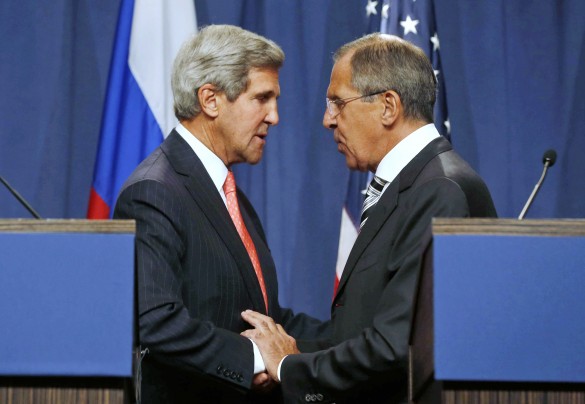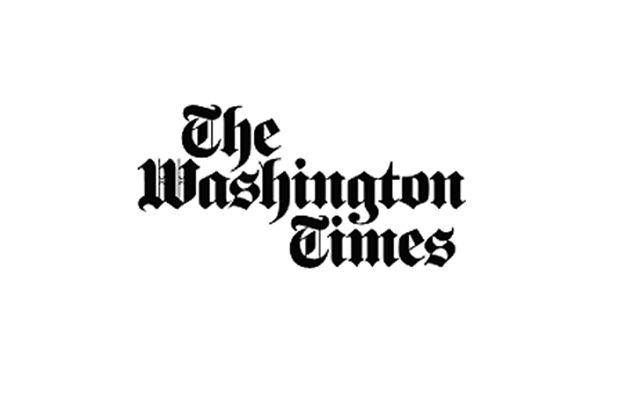
 GENEVA — The United States and Russia agreed Saturday on an outline for the identification and seizure of Syrian chemical weapons and said Syria must turn over an accounting of its arsenal within a week.
GENEVA — The United States and Russia agreed Saturday on an outline for the identification and seizure of Syrian chemical weapons and said Syria must turn over an accounting of its arsenal within a week.The agreement will be backed by a U.N. Security Council resolution that could allow for sanctions or other consequences if Syria fails to comply, Secretary of State John F. Kerry said.
Kerry said that the first international inspection of Syrian chemical weapons will take place by November, with destruction to begin next year.
Senior administration officials had said Friday the Obama administration would not press for U.N. authorization to use force against Syria if it reneges on any agreement to give up its chemical weapons.
The Russians had made clear in talks here between Foreign Minister Sergei Lavrov and Kerry that the negotiations could not proceed under the threat of a U.N. resolution authorizing a military strike. Russia also wanted assurances that a resolution would not refer Syrian President Bashar al-Assad to the International Criminal Court for possible war-crimes prosecution.
President Obama has said that the unilateral U.S. use of force against Syria for a chemical attack last month remains on the table. But consideration of that action, already under challenge by a skeptical Congress, has been put on hold pending the outcome of the Geneva talks.
The discussions here began this week following a Russian proposal Monday, quickly agreed to by Assad, to place Syria’s chemical arsenal under international control and eventually destroy it.
Kerry and Lavrov, negotiating behind closed doors with teams of disarmament experts, have said little about the talks that began Thursday. But administration officials in Washington provided some details on the condition that they not be identified or quoted directly.
The officials insisted that any agreement must be verifiable and include consequences for non-compliance. Short of a threatened use of force, it is not clear what those consequences would be.
The question of U.N. authorization for using force in Syria came up less than 24 hours after the Russians first made their proposal. France quickly drafted a resolution that threatened to consider "further necessary measures” — code words for military force — if Syria makes a deal and then breaks it. The draft, negotiated with the United States and Britain, was met with public statements from Lavrov and Russian President Vladimir Putin that they would not negotiate under threat.
Washington and London have now backed off the use-of-force provision, and a revised French draft being circulated at the U.N. Security Council has weakened it. Instead, the draft calls for continuous review of "Syria’s compliance . . . and, if Syria does not comply fully, to impose further measures” that are unspecified.
The draft still includes a provision to refer Syrian authorities to the International Criminal Court, but that provision could also be removed in subsequent reworkings as the Geneva negotiations continue.
The senior officials said they expected a U.N. resolution in some form to pass within weeks of a Geneva agreement.
One possible course of action, they said, is the internationally verified transfer of Syria’s chemical stockpiles to Russia, where they eventually would be destroyed.
The Kerry-Lavrov discussions hit snags Friday over ways to ensure all chemical stockpiles are identified, an official familiar with the talks said, but a second official said the two sides were "coming closer to agreement.”
Meeting in Washington with Kuwaiti Emir Sabah Ahmed al-Sabah, Obama said he had told the visiting leader that he hopes the U.S.-Russian discussions "bear fruit.”
"But I repeated what I've said publicly, which is that any agreement needs to be verifiable and enforceable,” Obama said.
Both Kerry and Lavrov called the talks productive, and they will continue Saturday. And they agreed to meet in about two weeks when both will attend the U.N. General Assembly’s annual gathering in New York.
"Now that the Assad government has joined the Chemical Weapons Convention, we have to engage our professionals together” with U.N. officials, Lavrov said Friday, "to design a road which would make sure that this issue is resolved quickly, professionally, as soon as practical.”
Assad sent a letter Thursday to U.N. Secretary General Ban Ki-moon saying that on Monday he will sign the international accord banning chemical weapons.
The Geneva talks are aimed at creating a blueprint for identifying and seizing chemical weapons that the United States claims the ruling Syrian government used to gas to death more than 1,400 people last month.
Kerry and Lavrov said successful diplomacy on chemical weapons could help revive negotiations they jointly proposed months ago between the Syrian government and the opposition fighting to unseat Assad.
A possible follow-up peace conference "will obviously depend on the capacity to have success here,” Kerry said after he and Lavrov met Friday morning with Lakhdar Brahimi, the U.N. and Arab League envoy to Syria.
Syria, which is not a party to the Geneva talks, denied until this week that it had chemical weapons. Under Russian pressure, Assad agreed to acknowledge the stockpiles and join the international weapons ban. Both Syria and Russia have said that the Aug. 21 attack, in the eastern suburbs of Damascus, was carried out by rebels, not the government.
The site of the attack was visited last month by U.N. investigators who are due to brief Ban on their findings Sunday. Ban told a gathering of women’s groups Friday that the inspectors have obtained "overwhelming” evidence that the attack took place, according to a U.N.-based diplomat.
"I believe that the report will be an overwhelming report that chemical weapons were used, even though I cannot say it publicly at this time,” Ban said in comments he apparently thought were confidential but that were captured on an internal television feed.
Ban did not say who was responsible for using chemical weapons or what nerve agent was used.
But the diplomat, who spoke on the condition of anonymity to discuss the unreleased results, said that "the report will clearly say it is sarin” gas and that "it clearly hints that the regime is the perpetrator.”
Ban is scheduled to present the findings to the Security Council on Monday.
Lynch reported from the United Nations, and DeYoung reported from Washington. Scott Wilson in Washington contributed to this report.
By Anne Gearan, Colum Lynch and Karen DeYoung



_jpg/250px-ElbeDay1945_(NARA_ww2-121).jpg)








